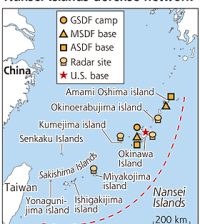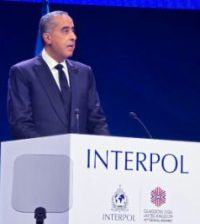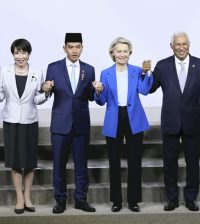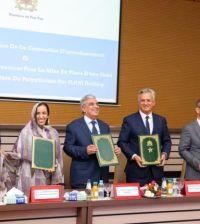- Washington “follows with interest” Morocco’s openness onto Africa (John Kerry)Posted 12 years ago
- The trial of South African Paralympic champion Oscar Pistorius opened in Pretoria on Monday.Posted 12 years ago
- USA welcomes efforts of King Mohammed VI in MaliPosted 12 years ago
- Egypt’s population reaches 94 millionPosted 12 years ago
- Mugabe celebrates his 90thPosted 12 years ago
- Moroccan Monarch to Build a Perinatal Clinic in BamakoPosted 12 years ago
- King Mohammed VI handed a donation of bovine semen for the benefit of Malian breeders.Posted 12 years ago
- Moroccan King’s strategic tour to Africa: Strengthening the will of pan African Solidarity and stimulating the south-south cooperation mechanisms over the continentPosted 13 years ago
- Senior al-Qaida leader killed in AlgeriaPosted 13 years ago
- Libya: The trial of former Prime Minister al-Baghdadi AliPosted 13 years ago
Arab–Russian Summit in Moscow: Sign of a New Pragmatism in Middle Eastern Diplomacy
When Russian President Vladimir Putin hosts the first-ever Arab–Russian Summit in Moscow later this month, the gathering will mark a symbolic moment in the gradual reconfiguration of global alliances — and in the Arab world’s increasingly pragmatic diplomacy.
All heads of state from the Arab League and the League’s secretary-general have been invited. Officially, the summit aims to “strengthen multifaceted cooperation and mutual benefit” between Russia and the Arab states, while contributing to peace and stability across the Middle East and North Africa.
Behind the formal language lies a shared search for balance: Russia seeks to break diplomatic isolation following Western sanctions over Ukraine, while Arab countries look to diversify partnerships beyond traditional Western allies.
A Calculated Strategy from Moscow
President Putin’s outreach reflects a methodical shift in Russia’s Arab policy. The Kremlin’s approach blends economic pragmatism and political neutrality, focusing on expanding trade, energy cooperation, and security ties — without taking sides in regional rivalries.
This posture has allowed Moscow to maintain dialogue with states that have diverging agendas, from Gulf monarchies to North African republics. Within the OPEC+ framework, Russia’s coordination with oil-producing Arab countries has reinforced its influence on global energy prices and offered partners a degree of policy synchronisation outside the Western orbit.
Gulf States as Pivotal Partners
In recent years, relations between Russia and the Gulf Cooperation Council (GCC) countries have notably deepened. High-level visits from the UAE, Qatar, and Oman to Moscow, coupled with new investment agreements in energy, infrastructure, and technology, have created tangible channels of engagement.
Most Gulf states have not joined Western sanctions on Russia, giving Moscow room to sustain trade and financial links. At the same time, Gulf capitals — particularly Abu Dhabi and Doha — have acted as quiet intermediaries in aspects of the Ukraine conflict, underlining their growing role as pragmatic global actors rather than ideological allies.
For the Gulf, the summit offers an opportunity to diversify economic and defence partnerships, enhance autonomy in foreign policy, and explore new technology and energy ventures with Russian counterparts.
Recalibrating on Syria and Beyond
Moscow has also used the summit’s preparation phase to re-engage diplomatically with Syria’s new government, signalling a readiness to revisit previous military and political arrangements. Damascus’s invitation to the summit is widely seen as part of a broader Russian effort to normalise relations with regional actors and reinforce its image as a stabilising power in the post-conflict Middle East.
Beyond Syria, Russia hopes to position itself as a broker in complex regional disputes, from Libya to Lebanon. Its presence in the Arab world is shifting from primarily military to economic and political influence, seeking long-term partnerships in industrial production, defence systems, and technology transfer.
Shared Interests, Diverging Motivations
For Arab states, cooperation with Russia is largely pragmatic. Economic diversification, energy security, and infrastructure development are immediate priorities. Yet for Russia, the summit is equally about diplomatic rehabilitation — reasserting its place on the global stage after Western isolation.
Both sides share an interest in reducing dependence on Western systems — financial, logistical, and political — while avoiding open confrontation with Washington or Brussels.
The summit is also expected to produce joint positions on key Arab concerns, including Palestine, Syria, and Lebanon, as well as proposals for joint projects in renewable energy, logistics connectivity, and infrastructure investment.
Emerging Trend: The Multipolar Middle East
The Moscow summit epitomises a larger trend: the rise of multi-alignment in Middle Eastern foreign policy. Arab states are no longer content to act as passive partners in Western-led alliances. Instead, they are increasingly engaging with multiple power centres — from Washington and Brussels to Beijing and Moscow — depending on the issue at hand.
For Russia, this diversification of Arab diplomacy offers an entry point into a region still critical to global energy, trade, and security. For the Arab world, it signals a cautious but deliberate turn toward strategic autonomy in an increasingly fragmented international system.
If successful, the Arab–Russian summit could mark not just a new chapter in bilateral cooperation, but a broader redefinition of Middle Eastern diplomacy — one driven less by ideology and more by converging national interests.




